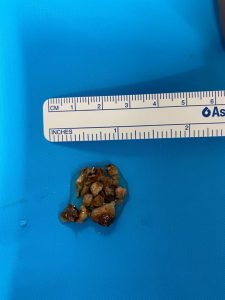As such, we as Urologists are often asked “what are the first signs of kidney stones?”, by people who are wanting to prevent and understand this painful condition.
People often think of kidney stones as one of the most common and painful urological problems that patients suffer from.
As such, we as Urologists are often asked “what are the first signs of kidney stones?”, by people who are wanting to prevent and understand this painful condition.
Kidney stones are essentially hardened mineral deposits that form in the urinary tract. They form when salts in the urine crystallise and clump together. There are different types of stones that can form, however most are calcium-based. Kidney stones are very common, in fact, the lifetime risk is around one in ten, with men being at higher risk of developing them than women.
After having a kidney stone, the risk of developing another is up to 10% each year!
The first signs of kidney stones often appear when the stone(s) become lodged in the urinary tract, causing inflammation, and sometimes even a blockage.
What are the first signs of kidney stones? Symptoms to recognise:
What are the first signs of kidney stones? Symptoms can vary greatly from person to person, but there are some common symptoms that can indicate the presence of kidney stones.

The first signs of kidney stones may include pain in the lower back, flank, or in the abdomen. The pain can be quite severe and it may come on suddenly or gradually. The pain can be intermittent or constant, and sometimes it may worsen with movement. In some people, the pain also radiates through the groin area.
Another common sign of kidney stones is pain or discomfort when urinating. This is sometimes accompanied with an urgent or frequent need to urinate, a burning sensation, or pain when beginning urination. Blood in the urine can also be indicative of a kidney stone.
Other first signs of kidney stones can include nausea, vomiting and fever. These symptoms can occur as a result of the body’s response to the presence of a kidney stone, or as a result of an infection or other complication caused by the stone.
What are the first signs of kidney stones? Sometimes, there are none!
It is important to note that not all people who have kidney stones will experience symptoms. In fact, sometimes the stones are incidentally discovered during imaging tests for other purposes, such as on ultrasound or CT scan. In some cases, these stones may be small enough to pass through the urinary tract without causing any pain or discomfort. Larger stones may require treatment to prevent complications such as renal colic.
What are the first signs of kidney stones? Should I be concerned?
If you have been wondering “what are the first signs of kidney stones?” because you have been experiencing some discomfort, or for some other reason you suspect that you may have a kidney stone, it is important that you see your GP or your urologist for an examination. Your doctor will take a thorough medical history, may perform an examination, or order diagnostic tests in order to determine your risk of having a kidney stone.
From there, if you require treatment, an appropriate management plan will be tailored according to your individual circumstances.
What are the first signs of kidney stones? How can I prevent them from forming?
It doesn’t matter whether or not you’ve had stones in the past, rather than waiting for the first signs of kidney stones, there are several steps that you can take in order to reduce your risk in the first place. The most important preventative factor is hydration: making sure that you are drinking enough clear fluids. All types of kidney stones can be prevented by ensuring that the urine is dilute enough. Reducing dietary salt intake and limiting the amount of animal proteins that you consume also helps to prevent kidney stone formation.
What are the first signs of kidney stones? Learn more…
If you are wanting to learn more about what the first signs of kidney stones are, or you would like more information on kidney stones in general, please visit the ‘Kidney Stones’ section on our website.
If you would like to arrange a consultation time with one of our urologists to discuss kidney stone treatment, please contact our rooms on 1300 702 811, or complete the online contact form. Please note that all new patients will require a referral from their GP in order to secure an appointment time.
